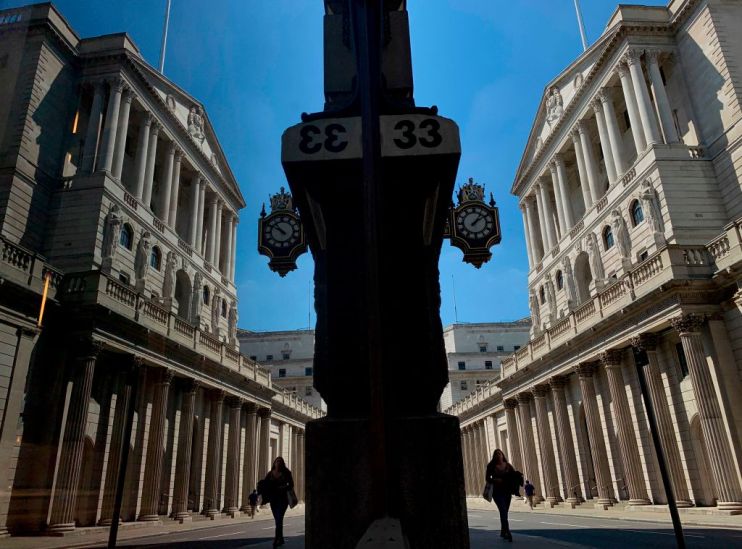FTSE 100 and US stocks slide following central bank announcements

The FTSE 100 continued trading in the red after the Bank of England announced it would keep monetary policy on hold, while Wall Street opened lower as tech stocks slumped.
The blue-chip index dropped 0.7 per cent before inching up marginally to trade down 0.4 per cent after the bank said the economy’s recovery had been “a little stronger” than expected.
The smaller FTSE 250 index slipped 0.6 per cent lower.
The BoE unanimously voted to keep its main interest rate at a record-low level of 0.1 per cent.
The pound slid after the decision as the minutes showed the Bank was consulting on how to cut interest rates into negative territory.
Europe’s continent-wide Stoxx 600 index fell 0.7 per cent. Germany’s Dax slipped 0.6 per cent and France’s CAC 40 fell 0.7 per cent.
Wall Street opened lower even as the Federal Reserve promised lower rates in last week’s meeting. Investors had expected the central bank to overdeliver but were left with an extremely dovish statement.
China’s CSI 300 slipped 0.5 per cent overnight. Japan’s Nikkei fell 0.7 per cent and Hong Kong’s Hang Seng tumbled 1.7 per cent.
Read more: Federal Reserve holds rates steady in upbeat US economic forecast
FTSE 100 dragged down by banks and miners
Multinational banks and miners weighed on the FTSE 100 in the morning session, as investors worried about the international economy after the Fed kept monetary policy on hold.
Natwest, Barclays and HSBC slip towards the bottom of the index on the back of the BoE, with Natwest dropping to their lowest levels since May.
Miner Polymetal International was the FTSE’s biggest faller, dropping nearly four per cent. BHP, Rio Tinto and Antofogasta all slipped more than two per cent. Analysts said big multinationals were dented by the lack of extra support from the Fed.
“Cyclical stocks went out the window with a big sell-off in miners and financials, and investors instead shifting their money to healthcare companies,” said Russ Mould, investment director at AJ Bell.
However, retailer Next’s shares jumped 3.2 per cent after it raised its profit outlook. The retailer revised its July forecast of £195m profit for the full year to £300m, but that was still sharply down from the £729m reported in 2019-2020.
The pound was down 0.1 per cent against the dollar at $1.296 as the currency continued to be buffeted by Brexit.
Wall Street weighed down by Fed decision
Wall Street extended its losses on Thursday following the Fed’s announcement and a tech slump overshadowed encouraging signs in the labour market’s recovery.
The benchmark S&P 500 slid 0.7 per cent while the Dow Jones shed 0.4 per cent.
The Fed yesterday forecasted that it would not raise rates until at least 2023, and said it would not tighten monetary policy until inflation had picked up over two per cent “for some time”.
Fed chair Jerome Powell warned the economy is not yet out of the woods: “Overall activity remains well below its level before the pandemic and the path ahead remains highly certain”.
But investors were disappointed by the lack of any near-term support from the Fed. US tech stocks sold yesterday, with the Nasdaq index closing 1.3 per cent lower.
That mood carried over into Asia, despite both the Fed and Bank of Japan yesterday upgrading their economic forecasts.
“What we’re basically dealing with is a market that was very short dollars and desperately in need of a bazooka moment in order to continue to justify it. This was extremely dovish but there was no bazooka”, said Craig Erlam, senior market analyst at Oanda.
Read more: Will the BoE inject more stimulus into the UK economy?
Tech stocks, which weighed on the market yesterday, were down again. Amazon, Microsoft, and Google owner Alphabet all shed at least one per cent while Apple fell 2.2 per cent.
Facebook, which came under pressure after reports it was facing an antitrust investigation from the Federal Trade Commission, have fallen further today, as the broader tech sell-off continues.
The tech-heavy Nasdaq index shed a further 1.34 per cent.
There was some glimmer of hope in the recent US jobless claims, as first-time claims for unemployment benefit resumed a gradual decline.
There were 860,000 new applications for the week ending 12 September, compared with 893,000 the previous week according to the Department of Labor.
And the number of Americans actively collecting state jobless aid fell, with continuing claims down to 12.63m, from 13.5m in the previous week.